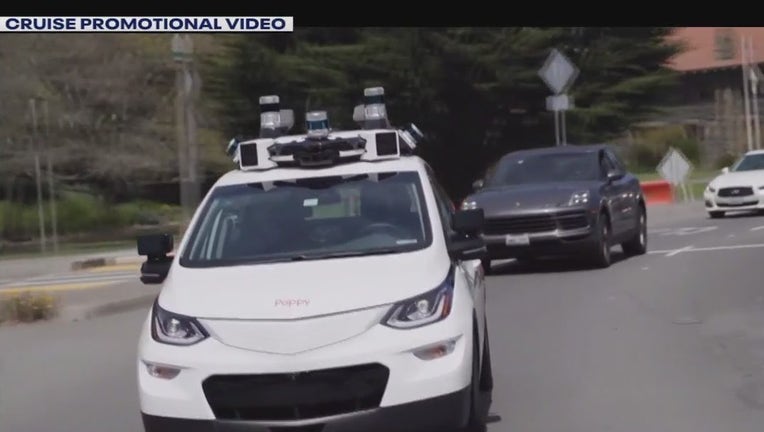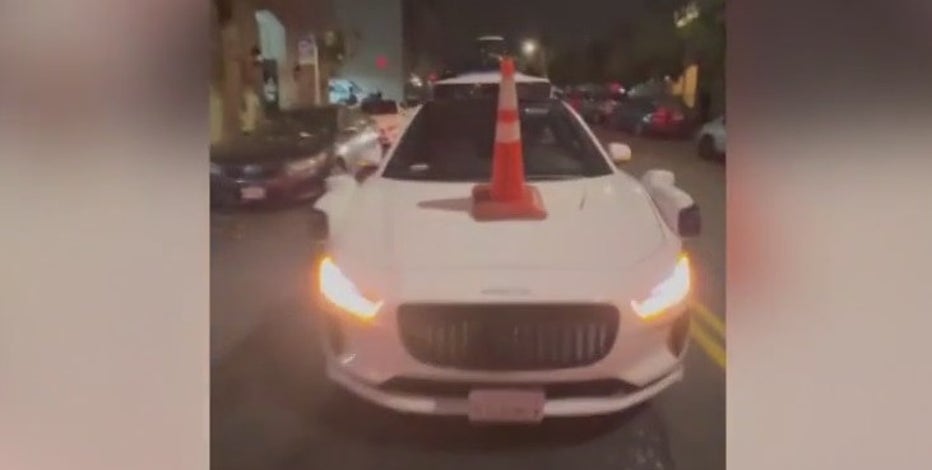SFMTA asks for more data, slower expansion of driverless cars in the city

GM Cruise autonomous cars
SAN FRANCISCO - The San Francisco Municipal Transportation Agency urged the state Tuesday to collect more data before allowing companies to expand their autonomous vehicle fleets in the city.
At the SFMTA Board of Directors meeting in City Hall, transportation director Jeffrey Tumlin gave an update to the board on the status of driverless cars in the city.
Tuesday's discussion comes amid a new plan to expand driverless car services in San Francisco, which the California Public Utilities Commission is set to vote on Aug. 10. The commission, which is responsible for regulations of autonomous vehicles or AVs, had previously postponed the vote.
SFMTA estimates more than 90 complaints about driverless cars were reported in both March and April, the two most recent months for which the agency has data. According to the agency, the cars stop in place when confused instead of pulling over; pick up and drop off passengers in traffic lanes and have difficulty understanding things like traffic control officers or construction sites.
For months, SFMTA has urged the commission to collect more data and implement driverless cars incrementally, claiming that the technology is not safe enough to be expanded.
Tumlin said autonomous vehicles do have the power to make roads safer and should be able to expand -- if their ability to meet standards can be backed up by data.
Tumlin said he's been asking regulators at the commission to establish rules based on performance metrics. The agency has pushed for companies that make autonomous vehicles like Cruise and Waymo LLCs to provide more specific data, including the location and duration of unplanned stops and the location of passenger pick-up stops.
"We also see the promise of safety and are enthusiastic about achieving that goal," Tumlin said at Tuesday's meeting. "We just want to make sure that there's a public verification of the claims."
For example, Tumlin said if a car's performance data show it often stops in the middle of the road, it wouldn't be allowed to drive during peak hours or in busy areas. He likened it to progressing from a learner's permit to a driver's license.
"So, if your AV can meet certain performance metrics, you move from one stage ... to the next," Tumlin said. "And that may be expansion of geography or time of day or number of vehicles."
Board of Directors member Manny Yekutiel said driverless cars have the potential to help prevent pedestrian deaths and to make streets safer.
"I think it's very, very possible that replacing drunk drivers, tired drivers, angry drivers with unemotional drivers in a way that can be demonstrated and safe could really help us in our fight to make our streets safer," Yekutiel said. "At the same time, if our city gets washed with tens of thousands of robot cars, it might affect the way we move people around San Francisco. So I'm glad that we're trying to think about how to do this safely."
Both Cruise and Waymo said they have made their data publicly available, which can be found at https://www.dmv.ca.gov/portal/vehicle-industry-services/autonomous-vehicles/autonomous-vehicle-collision-reports/. Cruise's safety record includes data on incidents, vehicle miles traveled, passengers transported and more, which amounts to more on-road data than what's provided by other types of vehicles. That record is on Cruise's website at https://getcruise.com/news/blog/2023/cruises-safety-record-over-one-million-driverless-miles/. Additionally, Cruise said it meets with SFMTA and other city agencies regularly, both proactively and after incidents arise.
"We are proud of our publicly reported safety record, which includes driving millions of miles in an extremely complex urban environment," Cruise spokesperson Navideh Forghani said in an email. "Interacting properly with emergency personnel is important to us, which is why we maintain an open line of communication with first responders to receive feedback and discuss specific incidents to improve our response."
Featured
Activists disable SF autonomous vehicles by placing traffic cones on hoods to make a point
As sophisticated as driverless cars are, a group called the Safe Street Rebels simply place traffic cones on their hoods that stops them cold.
Cruise said the majority of collisions it has experienced with driverless cars include them having the right of way or being rear-ended. The company has not had any fatalities or life-threatening injuries, they said, and cite 54% fewer collisions than human drivers.
Waymo has reported no collisions or contact with pedestrians or bicyclists, and reports that any car collisions were the result of violations or dangerous behavior on the part of the human driver. For less severe vehicle contact that doesn't meet federal standards for a crash, Waymo states that more than half of the cases were caused by a human driver hitting a stationary Waymo car.
The low collision rates are backed by the Public Utilities Commission's June resolution that approved Wamyo's application for a deployment permit. SFMTA, the San Francisco County Transportation Authority and the Mayor's Office of Disability sent a joint letter in protest of the resolution and highlighted driverless car collision rates, yet the commission countered this by stating human drivers were at fault for those collisions.
Four companies have deployment permits from the DMV that allow them to operate in certain locations. Four others have permits that only allow them to test their driverless vehicles.
One public commenter in Tuesday's meeting, Aleta Dupree, said she uses driverless cars and believes data such as pick-up locations should remain private to the companies. She also told the board that this option can help achieve more equitable transportation.
"They provide the promise of discrimination-free transportation," Dupree said. "This is a way that we can serve all kinds of neighborhoods and places with people who may not have access to personal automobiles."
Another resident, Jordan Smith, said in public comment that an autonomous car coming toward him got "within inches" as he crossed the street with his dog on a road that did not have a sidewalk or crosswalk.
"I think that's something that needs to be addressed before just willy-nilly going, 'Okay, let's open the floodgates to these things,'" Smith said.
SFMTA spokesperson Stephen Chun said the agency is "relieved that the commission has delayed its vote."
"We truly hope and are excited that automated driving can significantly improve safety and provide other benefits to those who travel in San Francisco," Chun said. "However, we are not there yet."


